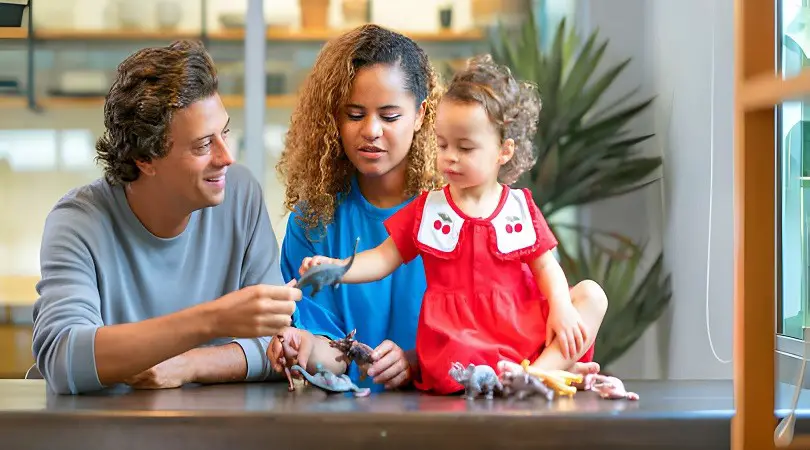Last Updated on January 6, 2025
For toddlers, language development is crucial for their overall growth and communication skills. It is essential to engage in active conversations, read to them regularly, and introduce new words through play and daily interactions.
As toddlers are naturally curious, providing a rich linguistic environment can facilitate their language development. Encouraging them to express themselves and expanding their vocabulary through positive reinforcement will aid in their language acquisition. Additionally, using gestures and visual aids can further support their understanding and retention of new words.
As parents and caregivers, being patient and consistent in these language development activities can significantly impact a toddler’s communication abilities in the future. By incorporating these tips into daily routines, toddlers can flourish in their linguistic capabilities.

Importance Of Language Development
Toddlers undergo a crucial phase of rapid language development, shaping the foundation for their future communication skills. The early years are pivotal in language acquisition as it lays the groundwork for cognitive, social, and emotional development.
Benefits Of Early Language Development
The significance of language development in toddlers cannot be overstated. Early exposure to language not only facilitates a toddler’s ability to express themselves but also enriches their social interactions, cognitive abilities, and emotional intelligence.
Impact On Cognitive Skills
Toddler’s language development plays a pivotal role in shaping their cognitive skills. The acquisition of language enhances their memory, problem-solving skills, and overall cognitive development, paving the way for lifelong learning and intellectual growth.
Creating A Language-rich Environment
Creating a Language-Rich Environment for your toddler is essential for their language development. It is the foundation for fostering strong language skills and cognitive abilities that will benefit them throughout their lives.
Reading Aloud
Reading aloud to your toddler is a powerful way to expose them to language. Choose a variety of age-appropriate books with colorful images and engaging stories. Bold expressions and varying tones to keep them captivated and emphasize different words and sounds.
Conversations And Narrations
Engage in conversations and narrations with your toddler throughout the day. Describe the activities you are doing, ask them about their day, and encourage them to express their thoughts and feelings. Make use of everyday interactions to weave in new words and concepts.
Encouraging Speech And Vocabulary
In the world of toddlers, encouraging speech and vocabulary is vital for their development. Here are some effective strategies to help your little one blossom in this essential area.
Positive Reinforcement
Celebrate each spoken word or attempt, reinforcing with praise and smiles to boost confidence.
Word Games
Engage in fun word activities like rhyming games or identifying objects to make learning enjoyable.
Utilizing Technology In Language Learning
Discover how technology enhances language learning for toddlers, providing interactive tools to boost vocabulary and communication skills effectively. Engage youngsters through digital platforms, making language development fun and engaging. Gain insights into innovative ways to immerse children in the world of words.
Educational Apps And Programs
In today’s digital age, technology has become an integral part of our lives. When it comes to language learning for toddlers, educational apps and programs can be a valuable tool. These apps and programs provide a fun and interactive way for children to explore language through engaging activities and games. Through the use of colorful visuals, catchy tunes, and interactive features, toddlers can develop their vocabulary, pronunciation skills, and linguistic abilities.
Interactive Learning Tools
Interactive learning tools are another fantastic way to enhance language development in toddlers. These tools can range from simple handheld devices with touch screens to interactive whiteboards and educational websites. By using these tools, children can actively participate in activities that encourage speaking, listening, and reading skills.
One example of an interactive learning tool is the use of interactive storybooks. These digital books allow toddlers to follow along with the story while interacting with the characters and the environment. By touching the screen, they can trigger sound effects, animations, and even dialogue. This immersive experience helps toddlers engage with the story and improve their language comprehension skills.
Utilizing Technology For Language Learning
When it comes to language learning, incorporating technology can significantly benefit toddlers. The availability of educational apps and programs, as well as interactive learning tools, provides a wide range of options to cater to different learning styles and preferences.
By making use of technology in language learning, toddlers can develop essential language skills in an entertaining and engaging way. However, it is important to note that technology should be used as a complement to other language development activities, such as reading physical books and engaging in social interactions. Striking a balance between technology and traditional learning methods is key for optimal language development in toddlers.

Recognizing Developmental Milestones
Explore language development tips for toddlers, from recognizing developmental milestones to enhancing their communication skills. Encourage language exploration through reading, singing, and interactive conversations, fostering a rich learning environment for young children.
Typical Language Progression
Understanding the typical language progression in toddlers is crucial for parents and caregivers. It helps them recognize if their child is on track or if there might be a language delay. By understanding what to expect at different stages of language development, you can provide appropriate support and guidance to your toddler. Here is a breakdown of the typical language progression:
- Stage 1: Pre-verbal Communication (0-12 months): During this stage, children use gestures, facial expressions, and sounds to communicate their needs and wants. They start babbling and imitating simple sounds.
- Stage 2: First Words (12-18 months): Toddlers typically say their first words around this age. They may have a vocabulary of about 5 to 20 words and can understand simple instructions.
- Stage 3: Two-Word Phrases (18-24 months): At this stage, toddlers combine two words to form basic phrases. Their vocabulary expands to around 50 words, and they can answer simple questions.
- Stage 4: Vocabulary Expansion (24-30 months): Children start using three-word phrases and have a vocabulary of around 200 words. They can ask more complex questions and express their thoughts and feelings.
- Stage 5: Sentence Development (30+ months): By this stage, toddlers can form longer sentences and communicate more effectively. Their vocabulary continues to expand, and they develop more advanced language skills.
Signs Of Language Delay
Recognizing the signs of language delay is essential for early intervention. While every child develops at their own pace, it’s important to watch for any potential red flags indicating a language delay. Here are some signs that may suggest a language delay:
- Lack of babbling or limited sound production
- Difficulty understanding simple instructions or following directions
- Inconsistent use of words or limited vocabulary
- Not responding to their name or other familiar words
- Struggling to put words together or form simple sentences
- Frustration or difficulty expressing needs and wants
- Difficulty engaging in conversation or maintaining eye contact
- Lack of interest in books or storytelling
If you notice any of these signs in your toddler, it’s important to consult with a pediatrician or a speech-language pathologist. They can assess your child’s language development and provide appropriate interventions if necessary.
Frequently Asked Questions
How Can I Help My Toddler Develop Language Skills?
Encourage communication through talking, reading, singing, and playing with your toddler regularly.
What Are Some Effective Language Development Activities For Toddlers?
Engage in activities like identifying objects, matching words to pictures, and storytelling to stimulate language development.
How Can I Expand My Toddler’s Vocabulary?
Introduce new words by naming objects, describing actions, and using different words for the same thing during conversations.
Is It Important To Praise My Toddler’s Language Efforts?
Yes, praise and encourage your toddler’s language efforts to build their confidence and motivation to communicate effectively.
What Should I Do If My Toddler Is Having Difficulty With Language Development?
Consult a pediatrician or speech-language pathologist if you notice any significant delays or concerns in your toddler’s language development.
Conclusion
As you navigate language development with your toddler, remember the power of positive reinforcement. Practice patience and consistency to foster language growth. By creating a nurturing environment, you are setting the stage for your child’s linguistic future. Embrace the journey and celebrate every milestone along the way.








